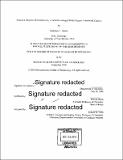Selective ethylene dimerization by a nickel-exchanged metal-organic framework catalyst
Author(s)
Martin, Kathleen E. (Kathleen Ewing)
DownloadFull printable version (4.665Mb)
Other Contributors
Massachusetts Institute of Technology. Department of Chemistry.
Advisor
Mircea Dincă.
Terms of use
Metadata
Show full item recordAbstract
Short linear [alpha]-olefins such as 1-butene are valuable commodity chemicals due to their use as comonomers in linear low-density polyethylene. Presently only homogeneous systems are used to catalyze ethylene dimerization in industry, causing many to suffer from quick deactivation and poor selectivity. The metal-organic framework (MOF) CPF-5 Mn₅(TBA)₃(HCOO)₃(OH)(H₂O₂)2]]₄·6DMF where TBA = 4-(l H-tetrazol-5-yl)benzoic acid provides an ideal structural template for the development of a heterogeneous catalyst for ethylene dimerization. Ni exchanged CPF-5 (Ni-CPF-5) treated with diethylaluminum chloride had a maximum turnover frequency of 23,000 mole ethylene per mole Ni per hour, and a maximum selectivity for 1-butene of 80% under optimized conditions. Ethylene pressure strongly influenced the activity and selectivity of Ni-CPF-5. Though the observed activity behavior is similar, the selectivity trends diverged significantly from previously reported MOF dimerization catalysts.
Description
Thesis: S.M., Massachusetts Institute of Technology, Department of Chemistry, 2016. Cataloged from PDF version of thesis. Vita. Includes bibliographical references (pages 31-32).
Date issued
2016Department
Massachusetts Institute of Technology. Department of ChemistryPublisher
Massachusetts Institute of Technology
Keywords
Chemistry.